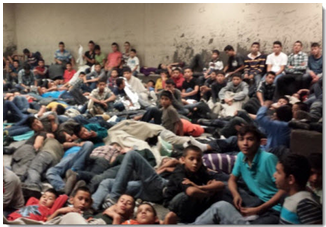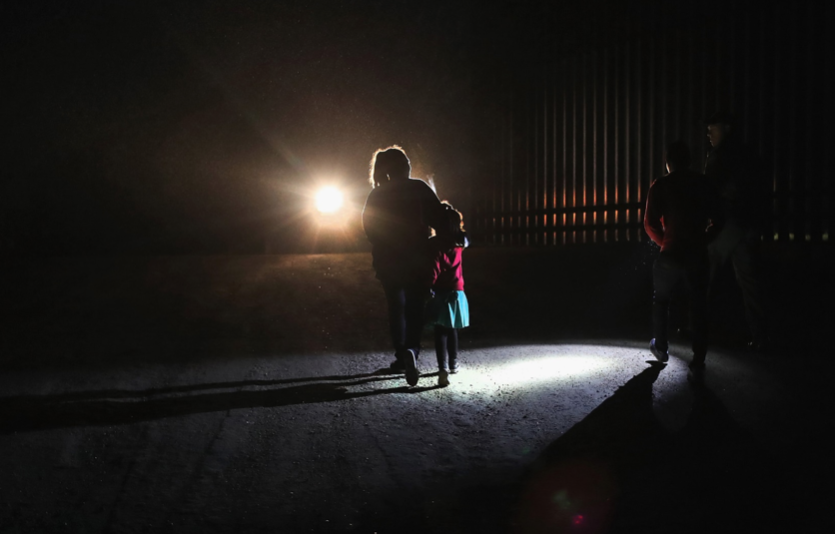CommentsBCK FILE--This past week, Sarah Fabian, the senior attorney for the DOJ’s Office of Immigration Litigation, told a panel of Ninth Circuit judges that it was “safe and sanitary” to house immigrant children without soap or toothbrushes, forcing them to sleep on concrete floors under bright lights. Fabian’s arguments went viral.
Meanwhile, new reports surfaced about the inhumane conditions in immigrant confinement centers at the border, along with rhetorical debate over Rep. Alexandria Ocasio-Cortez’s use of the term “concentration camps,” which seemed to have angered those who support Trump’s policies far more than the egregious conditions.
A central part of the Trump administration child separation policies and abuses have roots in a Reagan-era case that was debated for decades before arising in a 1997 legal settlement known as the Flores Agreement.
Until the passage of the Homeland Security Act of 2002, immigration laws and regulations were administered by the Immigration and Naturalization Services (INS). President George W. Bush shifted the responsibilities between three agencies, U.S. Citizen and Immigration Services, U.S. Immigration and Customs Services, and U.S. Immigration and Customs Enforcement (ICE), and U.S. Customs and Border Protection, all of which fall under the Department of Homeland Security.
In the mid-80s, a Hollywood actor placed a call to LA immigration attorney Carlos Holquin, setting the ball in motion. The daughter of the actor’s undocumented housekeeper from El Salvador, Jenny Flores, was being detained by the INS. The girl’s mother feared she would be deported if she picked up her daughter. The INS refused to release the daughter to cousins, stating that only legal guardians could pick her up.
By 1985, a class action lawsuit was filed on behalf of undocumented children by several activist groups, including The Center for Human Rights and Constitutional law, the National Center for Youth Law, the ACLU, and the law offices of Streich Lang (now Quarles & Brady LLC).
The aim of the suit was to establish standards for INS treatment of detained minors. Key to this suit was that Jenny Flores was strip-searched, sharing living quarters and bathrooms with adult males, and could not be released to non-guardians.
Three years later, Judge Robert Kelleher of the U.S. District Court for the Central District of California, a Nixon appointee, ruled that the INS strip search policy was unconstitutional because “the defendants had failed to establish a plausible, much less compelling, need to routinely strip search detained juveniles.” The judge also removed the INS restrictions about releasing detainees to non-guardians.
By 1990, a three-judge panel of the Ninth Circuit Court of Appeals had reversed the decision. Two judges had written in their majority opinion that the decision must be reversed because the district court ruling had been based on due process, an argument the judges had written must be rejected. However, the following year, the Ninth Circuit en banc reversed the decisions, affirming Judge Kelleher’s prior ruling.
In 1992, the SCOTUS began to hear oral arguments in the case. Justices Scalia, Rehnquist, White, O’Connor, Kennedy, Souter, and Thomas held that unaccompanied minors had no constitutional right to be released to anyone other than a close relative and could be kept in detention centers if no U.S. relative or guardian could take them. By 7-2, the SCOTUS had reversed the lower court’s ruling.
 Justice Scalia wrote that as long as the Government did not have the intent to punish the child and conditions were humane, custody was not in violation of the Constitution. Human rights activists continued to oppose the policies. In 1997, INS Commissioner Doris Meissner signed the Flores Agreement.
Justice Scalia wrote that as long as the Government did not have the intent to punish the child and conditions were humane, custody was not in violation of the Constitution. Human rights activists continued to oppose the policies. In 1997, INS Commissioner Doris Meissner signed the Flores Agreement.
The government conceded children must be released to parents, legal guardians, or people designated by the parents/guardians without delay; children must be placed in the least restrictive setting, and that mi nors must be kept in “safe and sanitary” facilities.
Twenty years later, under the Trump Administration, Judge Dolly M. Gee of the Central District of California concluded that the Customs and Border Protection division was not providing adequate food and water to minors. The facilities were not kept at adequate temperatures and minors were sleeping on concrete floors under bright lights. The judge also found the CBP’s failure to provide soap, towels, showers, toothbrushes, and dry clothes was in violation of the “safe and sanitary conditions” section of the agreement. She ordered the CBP to appoint a compliance monitor.
Hon. Gee’s appointment of a monitor is considered an “interlocutory order” that the government can only appeal if the judge modifies the existing injunction orders.
This brings us up to date to where we stand now. Fabian and other attorneys from the Office of Immigration Litigation are arguing before the Ninth Circuit that Judge Gee had modified the prior agreement by ruling that “safe and sanitary conditions” require specific requirements like toothbrushes, showers, and not forcing the detainees to sleep on concrete.
The mistreatment and abuses under the Trump Administration continue to push beyond all measures of human decency. The judges seem unlikely to rule on behalf of the government. To use children as pawns in a political game, subjecting them to intolerable conditions, is a horrific human rights violation that must end.
(Beth Cone Kramer is a professional writer living in the Los Angeles area. She covers Resistance Watch and other major issues for CityWatch.)
-cw
















